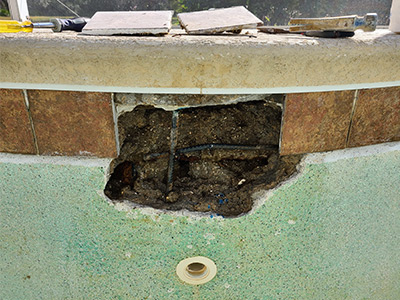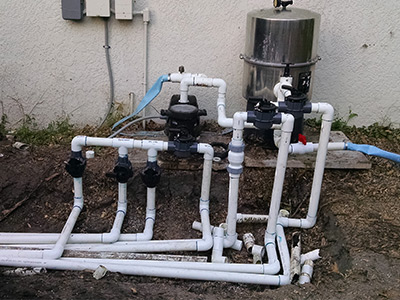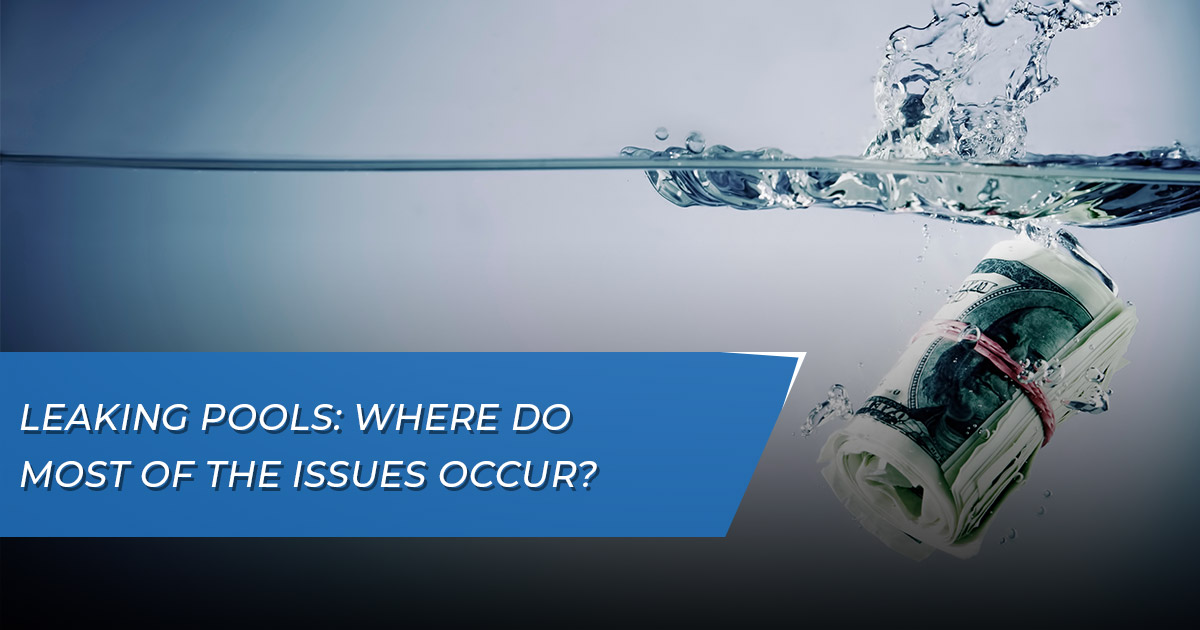Leaking Pools: Where Do Most of the Issues Occur?
One of the most important things to understand about owning a pool is that leaks are a problem you always have to watch for.
Many assume that pool leaks won’t be a cause for concern as long as they keep up with routine maintenance and don’t abuse their equipment. Unfortunately, this isn’t necessarily the case. There are actually a number of common reasons why leaky pool issues develop. Some of them are totally within your control and can easily be explained. Others have more to do with environmental concerns that, sadly, you have no real control over.
The key to mitigating risk in this area involves understanding as much as you can about why leaks occur so that you’ll take the right steps to avoid the problems associated with leaking pools. That way, you’ll have years to look forward to when you can enjoy all the benefits of having a pool with as few potential downsides as possible.
The Most Common Causes of Leaking Pools: Breaking Things Down
 By far, one of the most common reasons why leaky pool issues develop has less to do with the pool itself and more with things located around it: the trees in your yard that are probably an important part of your landscaping design.
By far, one of the most common reasons why leaky pool issues develop has less to do with the pool itself and more with things located around it: the trees in your yard that are probably an important part of your landscaping design.
Whenever you install a new pool (or purchase a house with an existing one), you naturally want the entire area to look its best. The desire is to have a space that creates a great impression when visitors see it for the first time. To accomplish this, many people choose to plant ash, pine, alder, and similar tree species to bring the whole look and feel of the yard together (unless these trees were already present on the property).
The problem is that all of these trees tend to have extensive root systems. Although you may not be able to see it from the surface, its roots can span the entire area of your yard as they continue to grow. Not only will these heavy roots crack and lift concrete (potentially damaging sidewalks and pool deck areas), but they can also cause long-term problems for the structure of your swimming pool.
By their nature, tree roots tend to seek out water sources. What could be more attractive to them than a massive pool of water?
Because of this, if you’ve started to experience pool leaks, the first thing you’ll want to investigate is the root system of any nearby trees. Pool leak professionals like those at GPS Pools have the knowledge and equipment necessary to determine whether this is the true source of your problems. They know how to minimize damage by doing something about it sooner rather than later.
Related Article: Pool Leaks: Signs Types and Risks of Ignoring the Issues
The Seismic Pressure Factor
A second major cause of leaking pools is another factor that, unfortunately, is largely beyond a homeowner’s control.
If you don’t live in a part of the country where earthquakes (even mild ones) are common, seismic pressure can still cause a number of leak-related issues. Even seismic pressure that develops deep below the surface of your yard may have ripple effects that show themselves in your pool and the surrounding areas.
If you do happen to live in an area that’s prone to earthquakes, it’s always important to check your pool (and related structures) when even the most minor tremor occurs. If anything, it’ll give you an opportunity to address a small issue now before it has a chance to become a much bigger problem later on.
Related Article: Pool Skimmer Leak: Why It’s a Common Leak Area
Ground Settling Considerations for Leaking Pools
This concern segues into another one of the major sources of leaky pools: general ground settling that happens naturally over time.
Ground settling is something that homeowners everywhere are undoubtedly familiar with. Not only can it impact anything located outdoors, but over the years the ground will settle to the point where it can have an effect on your house as well. Those mysterious creaks that you hear while lying in bed late at night likely come from the ground settling around your home, shifting the foundation and causing all sorts of things to change. The same phenomenon affects your swimming pool, too.
Depending on how long it has been since your pool was installed, ground settling could cause everything from minor leaks to cracks in the wall and floor. Settling can even create cracks in the larger foundation of the pool, too. This is another example of the issues that you always want to stay proactive about because they’re far easier to fix while they’re still in the early stages. The problem will be much more severe (meaning expensive) and difficult to address if it is allowed to persist for extended periods of time.
Related Article: Pool Leak Bucket Test: How and When to Do It
The Trouble With Aging Equipment
One major source of leaking pools that a lot of people overlook has to do with aging pool equipment. Just because something like your pool heater appears to be in good condition doesn’t mean the same can be said for the underground plumbing that connects everything together.
In many ways, this is not so different from the way plumbing works in your house. Just because a pipe itself is in decent condition and doesn’t appear to be the cause of a leak doesn’t mean that there isn’t a larger issue with the fittings that connect multiple pipes together.
As your pool equipment gets older, it just naturally becomes prone to leaks. If you know that you have a pool leak on your hands, but it happens inconsistently, there’s a good chance that this may be the cause.
Pool pumps in particular are a common source of leaks as they age. This happens because they tend to work harder than a lot of the other equipment that you’re using.
Sometimes seals and other components can also cause pool leaks. Yes, the entire purpose of a seal is to prevent leaks from happening. However, like virtually any piece of equipment that you install, it isn’t going to last forever. As seals break down, leaks become more likely to happen—meaning that you’ll need to install replacements as soon as possible.
Related Article: How to Find and Fix a Pool Leak
Chemicals, Temperatures, and More
 Finally, there are a number of other maintenance-related issues that could contribute to pool leaks, both in the short term and during your many years as a pool owner.
Finally, there are a number of other maintenance-related issues that could contribute to pool leaks, both in the short term and during your many years as a pool owner.
Chief among them is some type of prolonged chemical imbalance in your pool water. Most people assume that the sole purpose of the chemicals is to keep the water as clean and clear as possible. In reality, this is just one part of a much larger story.
If you allow your pool chemicals to consistently stay out of balance for a long time, the quality of the water may start to damage essential pool equipment. That could lead to breakdowns in the valves and seals that are in constant contact with water.
The water simply becomes too harsh and falls too far outside of “normal working conditions” for your equipment—and the plumbing that brings it all together—to keep up with. Thankfully, a pool leak repair technician like those at GPS Pools will be able to help determine whether this is the case. Not only can a professional assist with getting your pool water quality back to where it needs to be, but he or she can also offer helpful tips to make sure that it doesn’t happen again.
Finally, one of the biggest sources of pool leaks has to do with the temperature outside. Yes, it’s true that this concern is more geared toward people in parts of the country that experience all four seasons—but that’s not to say it can’t happen in a place like Florida, too.
If your area experiences drastic temperature changes, even only occasionally, it could lead to water freezing in your swimming pool. That water will begin to expand, potentially creating cracks in the side walls and floors that may trigger leaks and other problems. It might not be something that happens over the span of a single year, but it can result in serious damage over time—which is why you always need to be mindful of it. Of course, depending on how significantly the temperature drops and for how long, an issue could also develop after a single freeze.
Because of this, it’s essential to follow all pool winterizing best practices if you know that the temperatures in your area will begin to drop soon. It may take a lot of effort now, but it can prevent major troubles down the road.
Related Article: Pool Leak Detection Kits: Do They Work?
Don’t Let a Leaky Pool Get You Down
Yes, it’s true that a leaky pool can happen for a long list of different reasons. But that doesn’t mean you can’t still enjoy your pool all year long with the right proactive approach to maintenance.
Whether you’re looking for pool leak detection services or you just want to make sure you have the highest quality equipment to prevent these types of issues from happening in the first place, the team at GPS Pools has you covered. For years, we’ve been proud to serve nearby residents in Wesley Chapel, Pebble Creek, Tampa Palms, Odessa, Seven Springs, Lake Fern, and more from our locations in New Tampa, Lutz, and Land O’ Lakes to meet all of their pool needs, and we can’t wait for the opportunity to do the same for you, too.

